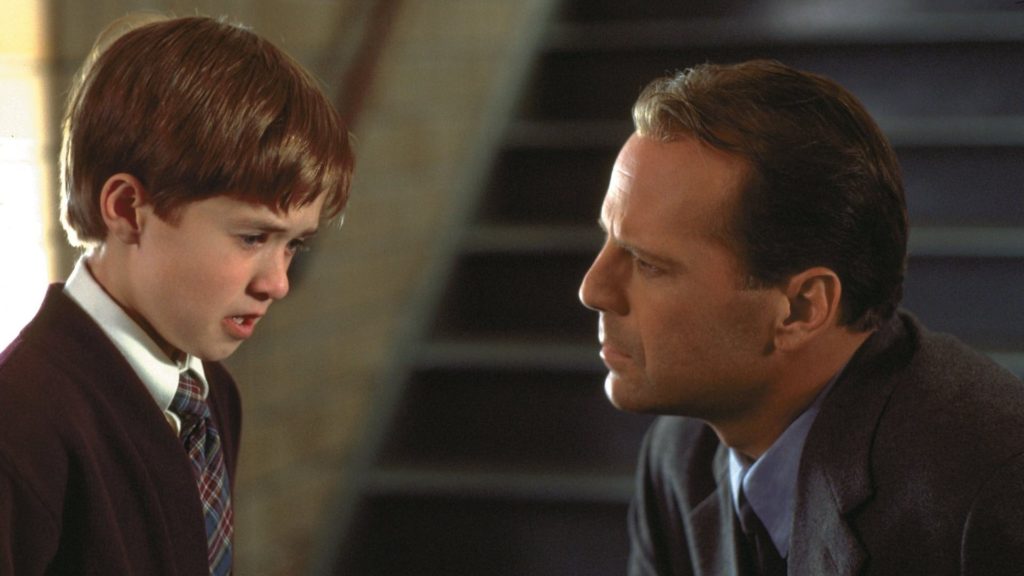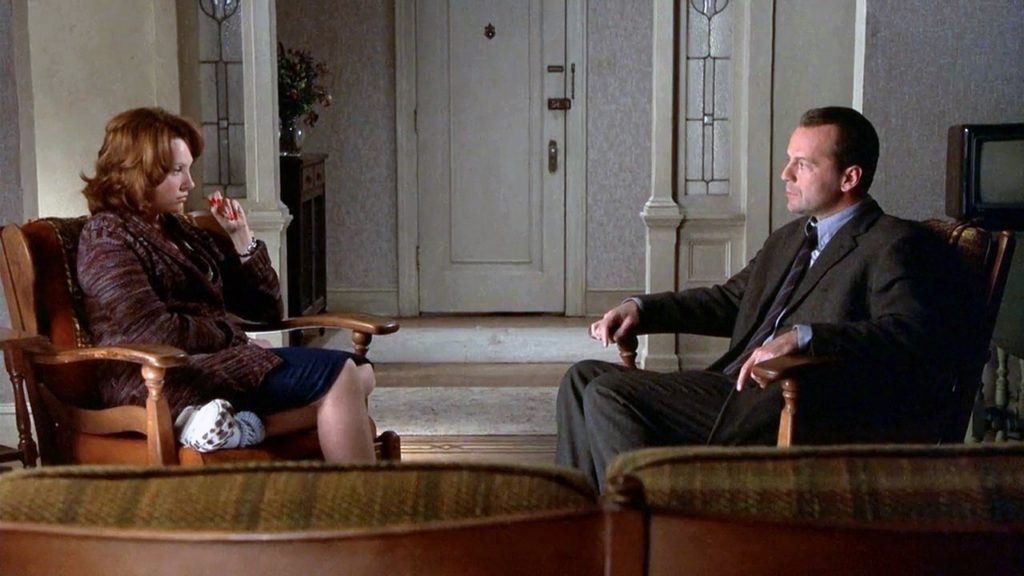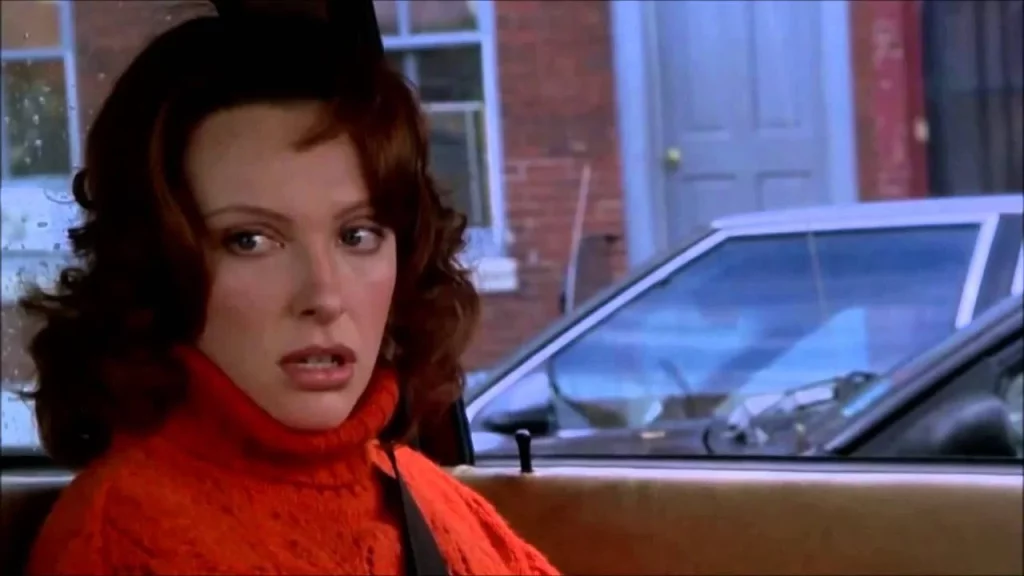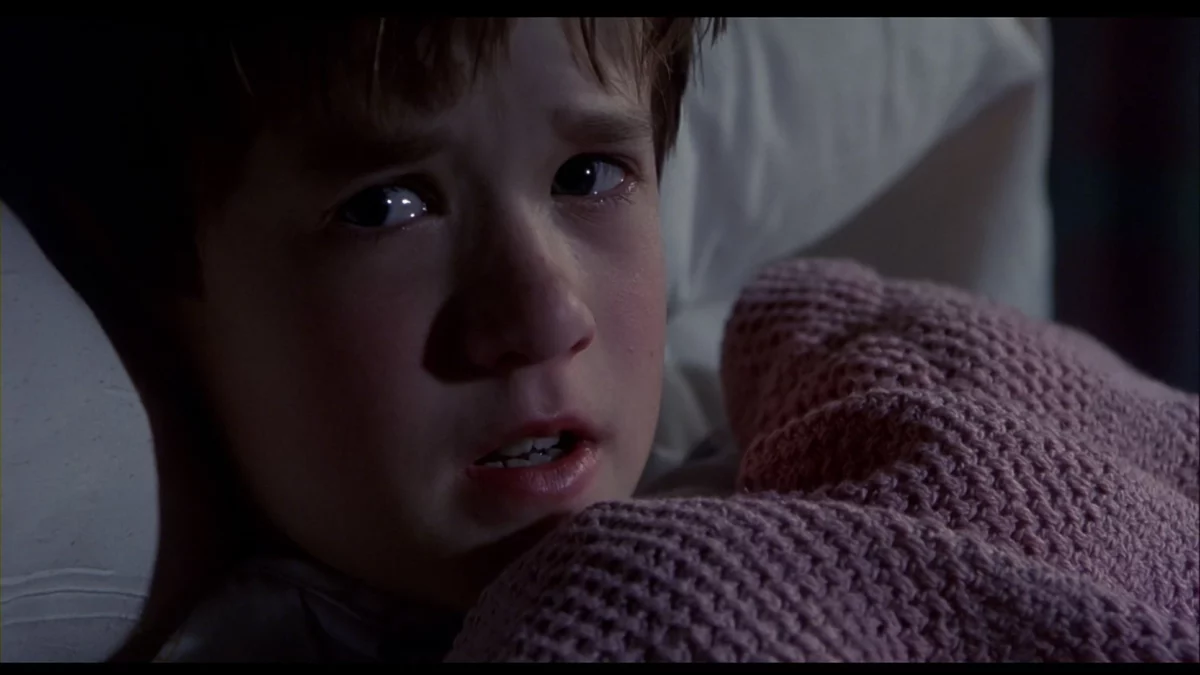Maybe the real dead people were the friends we made along the way
When we use the term “ghosts” in the English language, we can mean a number of things:The word can refer to spooky gusts of wind that rattle the china cabinet and manipulate household objects. In spiritual terms, it has a slightly different context: connections with souls who have departed this plane but linger in some way. Lastly, ghosts can be more metaphorical: long shadows left by certain people or moments in our lives.
M. Night Shyamalan explores each of these definitions in his absolutely terrific supernatural thriller, The Sixth Sense. It’s a ghost story in the traditional sense, but also much more earnest, reflective, and reverent than you’d expect, giving its characters deeply emotional inner lives. Superb performances from the entire ensemble bring the material to terrific heights, including one of the great child performances in cinema history from Haley Joel Osment.
The film is also structured around a storytelling gambit, one that’s so famous I’m going to spend the rest of this review assuming you’re already familiar with it.

Malcolm Crowe (Bruce Willis) is a child psychologist who works with especially troubled children. After surviving an incident in which a former patient invaded his home and attacked him, Crowe begins to doubt himself and his purpose. He questions if coming face-to-face with patients’ demons is worth the toll it takes on his personal life and psyche. His relationship with his wife breaks down, and he searches for some new spark in his life to give him a new mission.
Enter Cole Sear (Haley Joel Osment). This young patient of Crowe’s is haunted by the various ghosts previously mentioned. He’s crushed by the figurative specter of his parents’ divorce and social isolation as any boy in his circumstance might be. But there’s something different about Cole: his figurative haunting is matched by real-life visions of actual spirits of the dead. To him, these ghosts are corporeal and ever-present. He cannot control or command the ghosts, but he seems in tune with them, able to guide them to places of peace when he tries.
From the start, we understand that it’s not mere psychosis; something truly supernatural is involved. One of the movie’s first and best scenes is an extended single shot of a hectic breakfast shared between Cole and his mom, Lynn (Toni Collette). She leaves the kitchen, and when she returns, without a single cut, we see that Cole, in mere seconds, has opened every single drawer and cupboard in the room. I find this scene representative of the movie’s identity, so well-executed: a chilling ghost story connected to very real human angst.

When Crowe learns what is disturbing Cole (“I see dead people”), he resists taking case. But as the ghosts pile up in his own life, he gradually embraces Cole and his unique gift. He becomes a kind voice in Cole’s ear. He encourages Cole to use his ability to help heal others and, in doing so, heal himself. This reflects the arc Crowe himself goes through, helping heal Cole and in doing so putting his own life back together.
And then, in the closing 12 minutes of the film, we get the twist. Crowe is himself dead, one of the ghosts that Cole (and no other characters) has been seeing. This is one of those perfect, all-time great storytelling flourishes. It’s a fantastic twist because it completely reframes everything we’ve seen so far without feeling like a total cheat; there are more than enough hints to figure it out if you somehow hadn’t been spoiled on it, but it’s just subtle enough to be out of reach if you’re not looking for it. Yet, even when you know the twist, it doesn’t diminish the experience of watching the film. Instead, it makes the film even more exciting as a tense layer of dramatic irony pervades every scene.

What really makes the twist work is not just the clever structural and plotting tricks that make it fall into place, but the way it deepens every theme and character arc in the film. Crowe’s ambivalence about the personal cost of helping his patients becomes more profound (he literally died for his work). And for Cole, his acceptance of the dark realities and strangeness of life becomes much more radical: By taking the wisdom of a ghost, he finds an strain of truth that only he can tap into, as if some sort of neurodivergence. Cole is the only person left that Crowe can provide guidance to; and, indeed, Cole is the exact patient who needs him. Of course The Sixth Sense would work without its big twist, but it is a movie that benefits from one tremendously.
As the film leads us to its daring conclusion, it gets creepier, too. It becomes more of a horror film. Shyamalan invites us deeper into Cole’s world as the runtime progresses, gradually amplifying the supernatural sense of gloom and dread, but always tempering it with touches of humanity. In the film’s climax, we see more and more dead people from Cole’s perspective, culminating in a few unforgettable chills. The tensest scene of the film, shortly after Cole first decides to help the ghosts surrounding him rather than ignoring them, shows a young poisoning victim (pre-OC Mischa Barton) haunting Cole’s home.

Shyamalan, as he almost always does, extracts outstanding performances from his cast. Osment is genuinely phenomenal, delivering one of the all-time great child acting performances as a fragile yet intense young boy attempting to process his supernatural world. The young actor carries the film with a vulnerability and emotional charge in each of his expressions and line deliveries. Willis excels too, dialing down his usual gruffness for a more tender performance. Despite being the clear third-bill, Collette leaves a lasting impression; her chemistry with Osment is particularly heartrending. I especially admired a car ride scene late in the film when Cole finally opens up to his mother about the truth of his experience. (Osment and Collette received Oscar nominations in addition to the Best Picture, Director, Screenplay, and Editing noms.)
I do think the middle act of the film could be tighter; shaving off about fifteen minutes might have made the film flawless. I also don’t respond quite as much to Crowe’s portrait as I do Cole’s; Shyamalan and Willis could have probed deeper into the contradictions of the psychologist’s psyche to provide some heavier counterweight to Cole’s arc.
The Sixth Sense remains a remarkable film, a near-masterpiece and one that uses a ghost story thriller to probe deeper into themes of faith and coping. Shyamalan’s tics and habits would become a punchline in the coming years — I haven’t seen enough of his later films to say whether this critical thrashing he took is fully fair. But I can say without reservation that The Sixth Sense is something special that proves Shyamalan’s talent: He showcases the potential of supernatural thrillers to tell profoundly human stories in a way that hasn’t been done in quite the same way before or since.
Is It Good?
Exceptionally Good (7/8)
Follow Dan on Letterboxd or Twitter. Join the Discord for updates and discussion.

